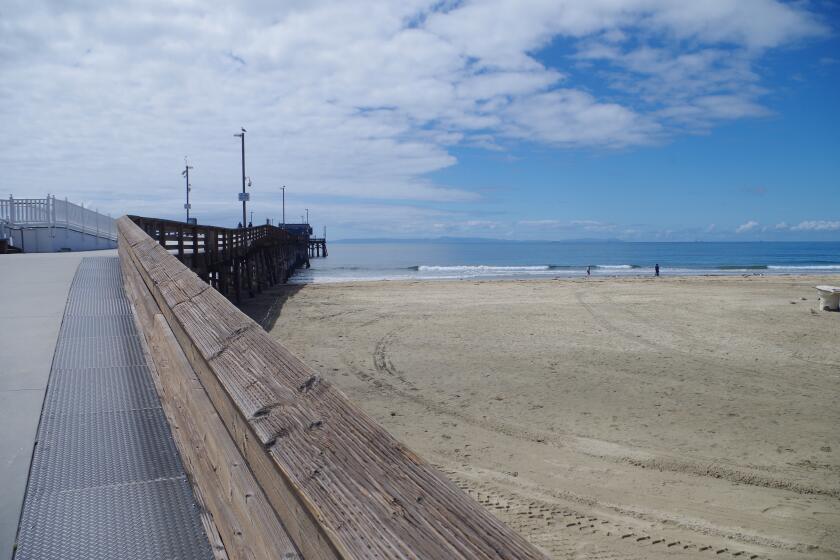Surf City’s Hardy mayor
- Share via
Dave Brooks
Councilwoman Jill Hardy has stayed out of the spotlight during most
of her two years on the City Council, but struck a few sparks earlier
this month when she backed a proposal to hold Fourth of July
fireworks off the pier, against the recommendation of the police and
fire chiefs.
Her reasoning was simple enough: she feels the majority of the
community wanted this year’s display over the water. A Huntington
High School Model United Nations instructor, Hardy said she often
relies on her sense of fairness and compromise to formulate policy.
She thinks these attributes will help her at the center of the dais
when she is sworn in as Surf City’s new mayor Dec. 6.
It will be a banner year for the 33-year-old Surf City native who
will serve as one of the youngest mayors in the history of Huntington
Beach and then marry fiance Greg Moore later this summer. The
Independent recently sat down with Hardy to discuss her plans for the
coming year.
How did you find your way into politics?
I started getting involved in city affairs when I was on the youth
board. I was appointed when I was 15. That’s sort of when I learned
what went on in the city and how it works. Then, after I graduated
from college, I got involved with different groups and I was
appointed to the Planning Commission in 2000.
What will you bring to the table as mayor?
I’m pretty good at listening to people. Even when they’re
complaining, I really enjoy talking to the citizens. To me, that’s
why I’m there and I really enjoy that part. I’ve given residents a
chance to talk to someone, like the fireworks issue. I was in the
parade two years ago and people were shouting at my float because the
majority of council voted against having fireworks at the beach,
although I voted for it. Anyway, people were yelling at my float and
I was like “Hey, I tried.”
Were you surprised the council approved fireworks at the beach?
I was very surprised. In fact, the only talk I heard afterward was
how surprised everybody was and I haven’t really heard anything else
yet. It’s been kind of quiet.
Do you plan to keep the invocation?
Yes, I said during the campaign that I would. It’s pretty obvious
that most of the people like having the invocation so I’ll keep the
tradition that Cathy Green reinstated.
What are your major policy plans for this year?
When I was on the Planning Commission, we had Planning Commission
goals that we wanted to see come through and we’ve never done that on
the council. With the new council, it might be a good way to look at
what we want to accomplish in the future.
With the major projects coming through -- Pacific City, the Strand
-- it’s time to start looking at the parts of our city that might
need to be renewed. I personally am encouraging the city to look at
the corner of Brookhurst and Adams, Beach and Atlanta and the Edinger
Corridor.
What can the city do to fix up the older areas?
Encourage the property owners to renew. The Edinger corridor and
Beach Boulevard both have specific plans that have been drawn up but
never implemented. We should look at that again. After all, we did
spend a lot of money on that. At Beach and Atlanta, I know the
majority property owner has some plans. This is a piece of property
that really needs help and we should help him along, so that his
plan, good or bad, can at least be discussed and if the public
doesn’t like it, we can go to plan B. If they love it, when can get
it through.
The council really took a beating from the public on the condo
conversion issue. What was it like to be at the center of so many
negative feelings?
That one was particularly frustrating because a crime was
committed and it’s sort of like getting caught with a stolen stereo
or counterfeit money -- the person that gets caught and punished
isn’t necessarily the one who committed the crime. The only way we
could make sure the person who committed the crime was punished was
to go after the person that currently owned the condo and have them
in turn go after the person who sold them the condo.
It was frustrating because the feeling was that we were punishing
the victim, and in a lot of ways that was true, but that was the only
way to make sure the criminal was punished. The settlement was a way
to help the victims out and to make sure these fees did get passed on
to the person that did commit the crime.
Was the settlement agreement the council’s true intention the
entire time?
I don’t know exactly what point that came up. The idea was always
that the current owners who were charged the fee would then go after
the title companies and then the original sellers so that they could
recover their money. The settlement just helped us not have to expend
the cost or the time in pursing those individuals.
All the latest on Orange County from Orange County.
Get our free TimesOC newsletter.
You may occasionally receive promotional content from the Daily Pilot.



